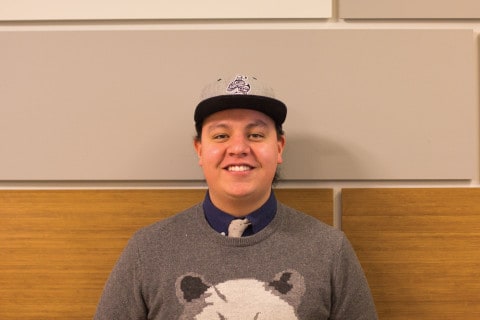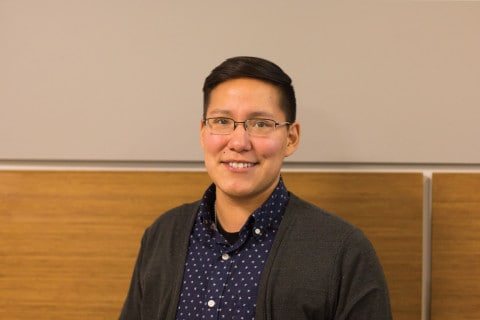SOMA DALAI
It’s half way through the school year and the University of Saskatchewan Students’ Union executive is transitioning into the second half of their term as the voices for the undergraduate population — making it the perfect time to check in and find out what they have been doing, what accomplishments they have made and what has become of their campaign promises.
 Max FineDay is now serving his second year as president of the USSU. In an email to the Sheaf, he said part of the reason he ran for a second term was to oppose TransformUS, the highly controversial cut-back program that former university president Ilene Busch-Vishniac instituted. FineDay also ran on a platform of pushing the university to create more childcare spaces, creating an open-textbook policy for students and lobbying to keep tuition rates low.
Max FineDay is now serving his second year as president of the USSU. In an email to the Sheaf, he said part of the reason he ran for a second term was to oppose TransformUS, the highly controversial cut-back program that former university president Ilene Busch-Vishniac instituted. FineDay also ran on a platform of pushing the university to create more childcare spaces, creating an open-textbook policy for students and lobbying to keep tuition rates low.
FineDay wrote that seeing TransformUS halted, and senior leadership held to account, was a major accomplishment during his second term as USSU president. He also said that he was proud of convincing the university to build a new daycare, though there remains work to be done. FineDay wrote that the USSU has achieved some success toward open textbooks by lobbying the province and the university, and cited Professor Eric Michaels as an example of the program’s adoption in his AG 113: Agrifood Issues and Institutions course.
A less well-known plank of FineDay’s platform this year was the implementation of tuition waivers for youth exiting foster care.
“Making our university more accessible for marginalized communities should be a priority for every university in Canada,” FineDay said.
 Serving as vice-president student affairs, Jack Saddleback said that he will continue to make mental health initiatives a priority and try to create a mental health strategy for the university. Saddleback also said he is working with the USSU Women’s Centre and university administration to create a sexual assault policy.
Serving as vice-president student affairs, Jack Saddleback said that he will continue to make mental health initiatives a priority and try to create a mental health strategy for the university. Saddleback also said he is working with the USSU Women’s Centre and university administration to create a sexual assault policy.
Saddleback counted the creation of campus childcare spaces, the USSU Indigenous Student Affairs committee and the USSU International Student Affairs committee as big accomplishments in term one of the school year. Regarding the two new committees, Saddleback wrote that having dedicated voices for these groups within the USSU will help address their unique needs as undergraduate students. After a successful Mental Health Awareness week in November, Saddleback also wrote that he saw positive change created on campus.
“Some ways that I am seeing this change take place is within one on one conversations with students and on our Facebook pages,” Saddleback wrote. “People are feeling it is important for all of us to be aware of our mental health and to reach out to those in need.”
 Coming into the second half of his term as vice-president finance and operations, Elias Nelson’s top priority is budgeting for the 2015–16 academic year. As per his platform, Nelson wrote that he is working to include written and visual supplements in the budget to make the numbers more meaningful to the general student population. Nelson listed his other two top priorities as revising the campus club’s guide as well as reviewing and revising the campus group insurance policy, which he wrote was already underway.
Coming into the second half of his term as vice-president finance and operations, Elias Nelson’s top priority is budgeting for the 2015–16 academic year. As per his platform, Nelson wrote that he is working to include written and visual supplements in the budget to make the numbers more meaningful to the general student population. Nelson listed his other two top priorities as revising the campus club’s guide as well as reviewing and revising the campus group insurance policy, which he wrote was already underway.
Nelson wrote that he would also like to address the fact that U-Pass expires before end-of-term for many professional college students, but acknowledged that time constraints and other limitations may mean this won’t be accomplished by the end of term two.
When asked about his main accomplishments, Nelson wrote that they lay in the work he has done for student groups.
“I have made it a personal policy to work with campus groups to ensure their chances of success when they apply for funding,” he wrote. By creating a “tabling package” that campus groups can book and creating efficiencies in ratification of campus groups by automating procedural steps, Nelson says he has made his job more efficient and effective.
 Writing about the end of TransformUS, vice-president academic Desirée Steele acknowledged that program prioritization is still a reality at the university — though in a less “draconian” manner. Steele wrote that she has spent much of her first term stressing the need for student engagement with regards to any further academic changes, especially those involving tuition.
Writing about the end of TransformUS, vice-president academic Desirée Steele acknowledged that program prioritization is still a reality at the university — though in a less “draconian” manner. Steele wrote that she has spent much of her first term stressing the need for student engagement with regards to any further academic changes, especially those involving tuition.
“I welcome students to tell me about their experience with this consultation, or lack thereof,” Steele wrote. “This will help inform the USSU’s upcoming report on how tuition conversations went this year and how they can be improved for next.”
With regards to her campaign promise of increasing experiential learning for students of all disciplines, Steele wrote that she was confident the university would meet its goal of increasing these opportunities by 20 per cent. Steele also wrote that she plans to make the university better at promoting existing co-ops, internships, clinical placements, research opportunities and study-abroad programs to students and increase the types of experiential learning available in colleges which currently lack them.
Leave a Reply